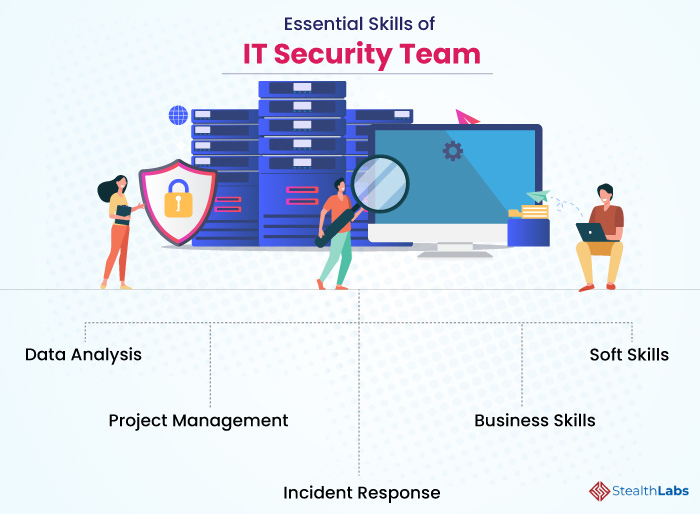In this digital age, cybersecurity is a necessity. And given the effects of the COVID-19 pandemic, more and more businesses are in need of cybersecurity solutions to protect their data against hackers. So, it is no surprise that the market for IT professionals has grown exponentially.
According to the US Bureau of Labor Statistics, information security analysts’ job outlook is expected to grow by 31% from 2019 to 2029.
Demand is to rise as companies and institutions inevitably require new cybersecurity policies in the process of migrating to the online sphere. Skilled IT professionals who know how to implement digital security measures can create these processes.
Here’s a list of five essential skills that your cyber security team needs in order to protect the company from cyber-attacks.

5 Cyber Security Skills Every IT Team Needs
1) Data Analysis
Data science has been making leaps and bounds in terms of progress, primarily due to all the technological innovations in the digital sector in recent years. To create an effective cybersecurity strategy, IT professionals need to know how to gather data and then utilize it to adopt better security measures.
Iqbal H. Sarker, a research-based Ph.D. student from the Swinburne University of Technology, writes that the utilization of data science helps in making more intelligent decisions regarding cybersecurity systems and services.
One such system includes machine-learning programs. By inputting data into machine-learning systems, one could potentially automate cybersecurity processes. Other cybersecurity systems include algorithm-driven software and AI technology. A competent IT professional must know their way around these systems and know when to utilize them.
2) Project Management
Another crucial skill is project management. IT security teams will likely be handling more than one aspect of cybersecurity.
There will be a need for strategies to mitigate insider threats, external threats, and general data protection policies. Not only this, but the team must also ensure that digital security programs are up-to-date and that all potential weak points in the system are addressed.
Given this, IT professionals need to be good at multitasking and be aware of what they need to prioritize.
3) Incident Response
IT professionals should also be skilled in incident response. This entails having the foresight to create backup plans in case of minor hindrances or even full-on cyber attacks. They’ll need to create a detailed Computer Security Incident Response Plan (CSIRP), a guide map explaining how the company will respond to different security threats.
The CSIRP should include plans in case of cyber attacks, malware, insider threats, and other forms of risks.
Moreover, should there be any unforeseen hindrances, IT professionals must be ready to adapt and think of solutions on the fly. Finally, the incident response also covers what happens after the said incident — writing reports, recalibrating IT systems, and planning how to improve them.
4) Business Skills
Business skills might seem out of place in this list. However, you’ll find that it’s more important as the digital age continues to progress.
The job of an IT professional spans multiple sectors. So, they require in-depth knowledge of each, including that of the business industry.
After all, security measures are more effective when they’re tailor-fit for the situation. In this regard, such policies will have to adhere to certain business norms and structures.
Fortunately, lots of universities across the country have started including business courses in their IT curriculum. Maryville University’s online cybersecurity program highlights the importance of business literacy in creating a robust digital defense for the private and public sectors. The university’s cybersecurity degree is part of John E. Simon School of Business to ensure their IT graduates are ready for dynamic business-driven environments.
Educational and training institutions for IT security are now beginning to recognize the importance of building up the business skills of tech professionals so they can function well in a digital-driven organization. Some of these crucial skills are time management, collaboration, and leadership.
5) Soft Skills
Finally, your IT professionals require an array of soft skills. These are often negligible in the context of the tech industry, but it would be a mistake to disregard them.
There is a long list of soft skills required to ensure an effective work environment. Communication is one of the most important. Because IT team members need to discuss strategies among themselves and then relay them to their employers. Other soft skills include creativity, flexibility, and determination.
In fact, educational institutions are beginning to realize the need for soft skills in a tech-focused world. A Montana State University computer science student, Zachary Schallenberger, admits that college lacked in teaching him basic interpersonal skills, like communication. It was only later as a professional that he had to hone it.
Soft skills like communication, though seemingly unrelated to tech, exist to complement the more technical skills. Although the planning comes from the IT security team, the entire organization plays a part in executing IT strategies. So, by knowing how to talk to people, you can communicate your IT strategies in an effective manner and ensure that nothing gets lost in translation.
These are necessary skills for a competent cyber security team. As you can see, it doesn’t just take technical know-how, but also industry knowledge and communication skills.
When hiring IT personnel, keep these skills in mind because they will save a lot of stress in the future. After all, cybersecurity starts with hiring the right professionals.
Written by: Allie Cooper

